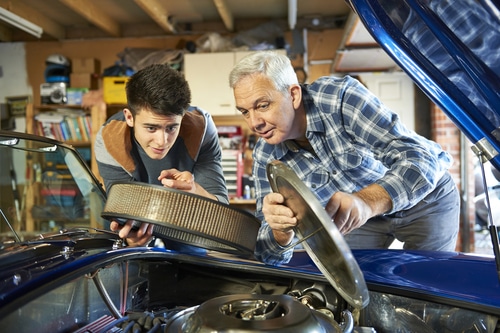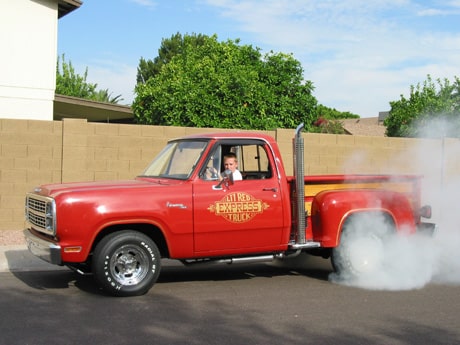 Classic cars and trucks can sometimes be temperamental. It take TLC to keep them running smoothly. Here are ten tips that will help keep your prized possession running more efficiently and will keep you safer out on the road.
Classic cars and trucks can sometimes be temperamental. It take TLC to keep them running smoothly. Here are ten tips that will help keep your prized possession running more efficiently and will keep you safer out on the road.
Treat yourself to tip top tires.
Tires are one of the most important parts of safety and efficiency. Proper tires allow you to brake, accelerate and provide traction for turning. If they are worn out or under-inflated then not only are you running a risk of having a blowout, but your gas mileage is also going to suffer. Even worse you could be causing permanent damage to your suspension. Temperature changes happen throughout the year so be sure to regularly check your tire pressure for optimum handling and gas mileage. If your car pulls to one side or the other you might also want to have your alignment checked.
Re-ignite the spark.
Not many other maintenance routines will make your engine happier than a fresh set of spark plugs. It’s what makes all the magic happen. Spark plugs are the key to properly igniting the air/fuel mixture flowing through your engine’s combustion chambers. Your engine will simply run cleaner and more efficiently with a fresh set of plugs. The result will be more power produced.
Freshen up your Filters.
Your classic needs to breathe in order to operate at its fullest potential. Just like your body needs to breathe freely to run a marathon, so does your vintage vehicle. Dirty, clogged filters will reduce you fuel efficiency and create other issues like a rough idle. Replace your filters often so your car can properly breathe.
Keep the oxygen flowing.
In addition to air flow through the filters, you also need to maintain the right oxygen to fuel ratio.
Almost all cars built after 1980 have oxygen sensors installed before and after the catalytic converter to monitor exhaust flow. These sensors determine whether your car is feeding too much or not enough fuel based upon the amount of oxygen in the air. A bad sensor can cause your car to consume much more fuel than necessary. It’s a good idea to have then replaced after hitting 100,000 miles regardless of their performance.
Keep the fuel flowing.
Just like the air needs to flow freely as mentioned earlier, your fuel needs the same freedom to flow.
Sediment in your gas tank is pretty much unavoidable. Eventually it is going to make it to your fuel filter which will restrict your gas flow or stop it all together. Make sure you replace this filter often. They are inexpensive, but can make a huge difference in overall performance.
Get new gauges.
Original gauges are only going to stand the test of time for so long before they start to give inaccurate readings. While it might not cause too many issues if it was the speedometer that went bad, having the temperature gauge go out on you can cause some serious problems. Reliable gauges help you to identify any mechanical issues early. If you aren’t able to upgrade the existing dash cluster, maybe consider installing some new gauges in another location so you can keep a close eye on your vehicles performance readings.
Is your ignition system on point?
Many cars made in the mid 70s and beyond were created with a points ignition system. These systems are less than desirable because they require a continuous cleaning and adjustment routine to keep your car running smoothly. The points can deteriorate over time and will need to be replaced. Instead you might want to switch to an electronic ignition system. They are much more reliable, provide a much smoother start up and also provide better fuel efficiency.
It’s all about the fans.
Mechanical fans and idling do not mix. Mechanical fans rely on engine speed to keep things cool. On the other hand electrical fans just need electricity. If your classic does not have an electrical fan system, do not fear. There are inexpensive, bolt-on systems that are easy to install. So whether you are stuck in gridlocked traffic or out cruising Route 66 the fan will always keep your engine at the optimum temperature. In addition, the electrical fan system frees up horsepower since the engine does not have to drive the belt for the mechanical fan system.
Stop beating those drums.
If you haven’t already, convert the brake drum system for disc brakes. Not only are disc brakes much safer they are also much easier and cheaper to maintain. If you plan on making your classic into a high horsepower street machine then disc brakes are an absolute necessity. Also having a single master brake cylinder is a bad idea. If it happens to leak or fail your entire braking system could fail. Make sure you have a dual master cylinder system in place to separate the operation of the front brakes from the rear. That way if one fails, you still have the other system to rely on. After all, stopping is pretty important
Do you have any other simple maintenance tips you would like to share with our readers? Please leave them in the comments below.

